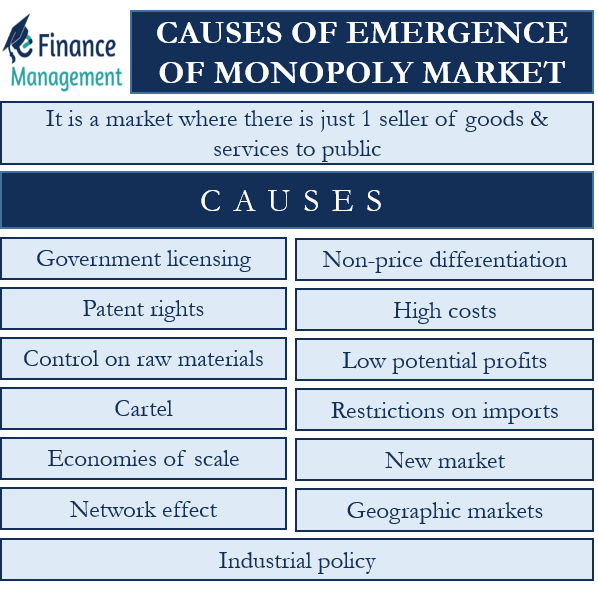A monopoly market is a structure with just one seller and many buyers. The seller that operates in this market is called a monopolist, and this firm commands absolute control over the supply and prices of products in the market. The primary reason for the existence of a monopoly market is the barriers to entry. Apart from this, there are many more causes of the emergence of a monopoly market.
In this article, we will look at those causes of the emergence of a monopoly market.
Causes of Emergence of Monopoly Market
Following are the causes of the emergence of a monopoly market:
Government Licensing
A company needs to get a government license before entering into a particular industry. It is possible that government doesn’t grant a license to new firms to operate in a specific industry. The reason for not granting the license could be many, including social, political, and economical. Whatever the reason is, it helps in the emergence of the monopoly market.
Patent Rights
Companies perform Research and Development, and if their R&D is successful, the government gives them the exclusive right. This allows the company to develop a product or service without close substitutes. This, in turn, helps in establishing the monopoly market. Xerox, for example, got the 15-year exclusive patent rights to xerography.
Control on Raw Materials
If a company enjoys sole ownership or control over the crucial raw materials, then it helps with the emergence of the monopoly. De Beers is an excellent example of this, as it controls a significant amount of diamond production globally.
Cartel
This could be another reason for the emergence of a monopoly market. A cartel is a situation when some firms collaborate to control the production or supply and prices. Usually, such a cartel conspires to limit the output so as to maximize profits. OPEC (Organization of Petroleum Exporting Countries) is a perfect example of a cartel.
Economies of Scale
A large firm usually enjoys significant economies of scale. This allows it to reduce prices and drive out competitors. So, we can say that economies of scale deter other firms from entering the market as they know they won’t be able to compete in terms of price.
Network Effect
This means that people get so much habitual in using one product that they never want to switch. Microsoft Windows is a very good example of this. Almost everyone uses this operating system since their school days. So they become so habitual to it that they don’t feel like switching to other OS even when they start working professionally. Moreover, it is easy for companies as well, as they don’t have to separately train employees to use the Windows.

Non-price Differentiation
Usually, the price works as a barrier to entry, but sometimes factors other than price can also work as a barrier to entry. A company may use some method to come up with unique and superior goods. This discourages buyers from switching to substitutes.
Also Read: Types of Market
High Costs
High cost is one of the main reasons that deter other firms from entering a specific industry. The railway is a good example of this. For a new company, it would require millions to set up a new infrastructure to compete with the existing railway. So, we can say that high fixed costs and start-up costs deter new firms from entering a particular industry. Oil and gas is another such industry.
Low Potential Profits
If the profit that a monopoly firm is making is small, it could discourage competitors from entering the industry. Small profit would generally make rivals feel that entering a particular industry won’t be worth their time and money.
Restrictions on Imports
If a government puts in place import quotas, tariffs, and other trade restrictions, it could also support a monopoly market. For instance, if a govt. doesn’t allow the imports of products that the monopoly firm sells, it will strengthen the monopoly market. Similarly, if the government impose tariffs on import so as to make them more expensive than the domestic product that the monopoly sells, it will also strengthen the monopoly.
New Market
If a market is new, then the first company to enter the market usually enjoys a monopoly status. And, if it is able to consolidate its position with other barriers to entry, it could enjoy the monopoly status for a long time.
Geographic Markets
This implies the presence of one firm within a specific geography. For example, if a small town has just one restaurant, then that restaurant enjoys the monopoly status.
Industrial Policy
It is seen that when a government opens a sector to private companies that were earlier reserved for government enterprises, usually big business houses are the first to participate in it. This gives them an opportunity to expand and cement their position as a monopolist.
Final Words
So, these are the causes of the emergence of a monopoly market. It must be noted that barriers to entry are the main reason that helps a firm to maintain its monopoly status, and all other causes just add to the barriers to entry factors. Or, we can say that they act as different types of barriers to entry. Licensing requirements, for instance, deter many firms from entering a particular market.
Monopolies, however, tend to lose their prominence over time (except for natural monopolies). Causes such as patents, high costs, and more may deter competition now, but these factors may not hold over the long term.

